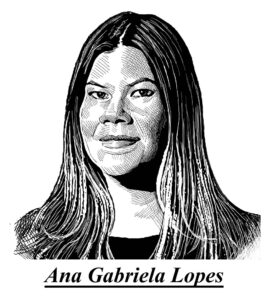Rock in Rio and BBB without Twitter (and without Boninho); and the 90-year-old Paraguayan Mickey

Is there life for brands after Twitter? Does BBB survive? Does Rock in Rio survive? Does Xandão survive? Ok, Xandão was just a poetic license. And what about BlueSky? For this wonderful second edition of the new CMO Journal column, and to answer these questions, I spoke with the CMO of iFood, with the head of Johnny Walker, and with the agency that manages Rock in Rio’s networks. Obviously, you will have to read to find out everything.
But as this country doesn’t live only of Rock in Rio, Twitter, and Big Brother, I also share a surprising data (at least for me) on how Brazilians are using Alexa to make purchases, according to a cool study by VML. There are also TikTok soap operas, in the best Manoel Carlos style, because the best thing about Brazil is still the Brazilian people.
Better than Brazilians are only the Paraguayans… There they have the trick of having Harvard University Paraguay and Mickey. I’d say it’s a story that will bring great learnings for entrepreneurs who are currently looking to internationalize their brands. Shall we?
How I miss Twitter!
Rock in Rio is the first major event since Supreme Court minister, Alexandre de Moraes, Xandão, had Twitter X taken down. When he made this decision, there were less than 15 days before the start of the festival, and the 85 partner brands, accustomed to measuring success via Twitter, had to rethink their strategies. It’s not easy to measure conversations now, and it’s necessary to use other metrics to justify the million-dollar investment.
Not so much buzz

The CMO of iFood, Ana Gabriela Lopes, says that the brand is making the most of other channels like Instagram and TikTok, but answers honestly: “in terms of engagement, we still have to see if BlueSky will take off. We feel that it doesn’t have the same impact, with people commenting and talking about your brand. Also, BlueSky isn’t that big.”
(Indeed: it’s estimated that there are 3 million Brazilians compared to the 20 million Twitter had).
Ana concludes: “And Big Brother, how’s it going to be?”. The brand is also a sponsor of the reality show.
Well, how’s Big Brother going to be?
On the first day of Rock in Rio, another anxiety crisis for the brands: besides not knowing if there will be Twitter or not, Boninho announced that he was no longer part of BBB. The gossip spread on the networks with the news that Boninho was going to X-Twitter. He had posted on Elon Musk’s profile offering a solution for X.
Will they have to migrate
Ronaldo Martins, the CEO of A-Lab, the company that manages social media for Rock in Rio and 10 other brands, has a hunch in case Twitter doesn’t return by then: “they will have to make sure this conversation migrates to a platform with open data. We already see BlueSky’s logo at the end of Jornal Nacional.”
Johnny kept going
The Johnny Walker brand was sad not to have Twitter to see conversations happening, but they weren’t discouraged and decided to focus on collaborations with influencers and artists performing at Rock in Rio. On other platforms, of course. Andréa Rubim, the brand’s head, says that this way they can better measure the quality of interactions.
Alexa, buy for me?
The VML agency will launch the eighth edition of a comprehensive study they conduct worldwide (Future Shopper), with a surprising data for Brazil, at least for me: 32% of Brazilian consumers regularly use voice assistants to make their online purchases. Brazil is only behind India (42%) and China (34%). It was the first time the agency included this question in the survey.
TikTok soap opera
Anyone who doesn’t use TikTok or Kwai must not know that soap operas are trending on these platforms, with millions of viewers. A real soap opera, with episodes, openings, actors, dramas, sets, and… commercial breaks.
One of the first to come up with commercials during the breaks was Reeh Augusto, who has over 6 million followers on TikTok and has created and produced about five soap operas for the platform. His first sponsor was KitKat Cereal. The brand sponsored two episodes, which had 1.2 million views.
Paraguayan Mickey
The New York Times detailed a surreal story this week. In 1935, Pascual Blasco “created” a brand: Mickey. It’s unclear how he came up with the idea (how could that be?). He opened a little shop with that name, used a drawing of a big-eared mouse (yes, almost identical), and sold fruits and ice cream.
Over the years, the company grew and now sells hot sauce, soybeans, colorful sprinkles, panettone, and seven types of seasonings. It’s been in the family for three generations. The best part (or the worst, depending on your point of view): Disney’s Mickey tried to bring down the Paraguayan Mickey in the late 90s but failed.
The lesson
If you want to be global, run to an intellectual property lawyer.

Arwen Volkov, A graduate of the University of St. Gallen in Switzerland with a degree in International Finance, Arwen specializes in sustainable finance and green investments. She began her career at an investment bank in London, where she developed financing models for environmentally friendly projects. Known for her analytical and strategic thinking skills, Arwen is a sought-after financial consultant. In her spare time, she mentors fintech startups, contributing to their growth strategies. She is also a nature enthusiast and an amateur photographer.
